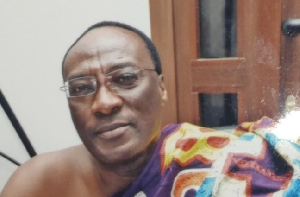 Togbe Tepre Hodo IV, Paramount Chief of Anfoega Traditional Area
Togbe Tepre Hodo IV, Paramount Chief of Anfoega Traditional Area
A two-day traditional leaders' capacity-building workshop was held at Steven's Hotel, Ho, on November 26 and 27, 2024.
The theme for the program was "Ending Child Marriage in Ghana: One Paramountcy at a Time."
The workshop, organized by the Obaapa Development Foundation (ODF) in collaboration with the United Nations Population Fund (UNFPA), brought together traditional leaders from all divisions of the Anfoega Traditional Area, members of the Local Council of Churches, representatives of the Muslim community in Anfoega, some youth, and Christian youth leaders as participants.
Anfoega Traditional Area is the fourth paramountcy to participate in the program, following Avatime, Oguaa, and Akwamufie.
Welcoming the participants, UNFPA representative Dr. Doris Mawusi Aglobitse shared statistics on child marriage in Ghana and emphasized the aim of declaring zero tolerance for the practice.
The main thematic areas of the workshop included issues surrounding child marriage, sexual and gender-based violence (SGBV), and the modification or abolition of other harmful cultural practices.
In his speech, the Chairman for the occasion, Togbe Tepre Hodo IV (President of the Volta Regional House of Chiefs), thanked the organizers and described child marriage as a "distressing" issue. He urged participants to pay "rapt attention" to the lectures for effective implementation.
Representatives from the Social Welfare Department, Ghana Education Service, Ghana Health Service, and the Volta Regional House of Chiefs delivered goodwill messages. They highlighted the importance of the program and outlined roles their respective departments play in preventing child marriage.
ACP Mercy Brown from the CID Headquarters educated participants on the legalities of child marriage and associated punishments. She also discussed laws regulating domestic violence and other forms of SGBV.
Speaking on the "Health Implications of Child Marriage," Senior Public Health Officer Mr. Dzidefo Kofi Agbavor from the Directorate of Public Health of the Volta Regional Health Directorate classified the effects under four categories: physical, mental/emotional health risks, social/economic impact, and long-term health implications. He also outlined intervention packages offered by the Ghana Health Service to victims of child marriage.
Mrs. Thywill Eyra Kpe from the Department of Gender (Ministry of Gender, Children, and Social Protection) enlightened participants on gender concepts, SGBV, and harmful practices.
Nana Hemaa Awindor, Executive Director of ODF, highlighted the roles of traditional and religious leaders in ending child marriage.
During the workshop, participants were assisted in groups to draw up action plans for implementing the program.
In her closing remarks, Dr. Doris Mawusi Aglobitse, the Gender Lead at UNFPA, reiterated the workshop's objective and UNFPA's commitment to its achievement.
The program concluded with a Declaration Durbar at Anfoega on Thursday, November 28, 2024, setting the stage for the rollout of the implementation action plans.